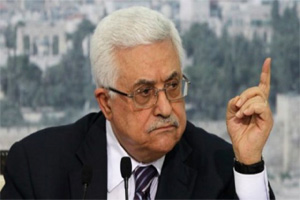 Ramallah, West Bank: Palestinian President Mahmoud Abbas blamed Hamas on Friday for extending fighting with Israel in the Gaza Strip, casting doubt on the future of the Palestinian unity government that the group backs, while Israel’s premier said the end of the war could mark resumption of peace talks with Abbas.
Ramallah, West Bank: Palestinian President Mahmoud Abbas blamed Hamas on Friday for extending fighting with Israel in the Gaza Strip, casting doubt on the future of the Palestinian unity government that the group backs, while Israel’s premier said the end of the war could mark resumption of peace talks with Abbas.
Benjamin Netanyahu stressed that it is still early to tell “if the new reality” would allow a political process to resume but said he is examining the possibility.
The remarks by the leaders come a few days after Israel and Hamas reached a truce after 50 bitter days of fighting.
More than 2,100 Palestinians were killed, including hundreds of civilians. Seventy one people on the Israeli side, including six civilians were killed.
Several Egyptian mediated ceasefire attempts during the conflict failed. Hamas eventually accepted almost the same truce offered at the beginning.
“It was possible for us to avoid all of that, 2,000 martyrs, 10,000 injured, 50,000 houses [destroyed],” Abbas told Palestine TV in remarks broadcast on Friday. He said Hamas had insisted on discussing demands first before ending the war, which only served to prolong the violence needlessly.
The war began after three Israeli teens were killed in the West Bank by Hamas operatives in June, prompting Israel to arrest hundreds of Hamas members there. Rocket fire from Gaza on Israeli cities then escalated and Israel launched a massive air and later ground campaign in retaliation. Fighting lasted almost two months.
Egyptian formula
Egyptian mediators tried early on to get the sides to agree to a ceasefire. Several temporary truces were broken by Gaza fighters.
“The Egyptian formula was on the table on July 15th, it was backed by the Arab League, it was accepted by Israel but rejected by Hamas then and now more than a month later has belatedly been accepted by Hamas,” Israeli government spokesman Mark Regev said.
“As the dust clears from the conflict I’m sure many people in Gaza will be asking why did Hamas reject a month ago what it accepted today, and if it had accepted then what it accepted now, how much bloodshed could have been avoided.”
The two sides agreed on Tuesday to an open-ended truce. The ceasefire brought an immediate end to the fighting but left key issues unresolved. Hamas immediately declared victory, even though it has very little to show for the war.
While Israel agreed to loosen a long-standing blockade to allow humanitarian aid and reconstruction materials into Gaza, many of the border restrictions will remain in place. Hamas, meanwhile, rejected Israel’s demands that it disarm.
These deeper matters are to be addressed in indirect talks in Egypt next month.
Abbas, whose Palestinian National Authority formed a unity government backed by Hamas earlier this year questioned the future of that arrangement in the interview.
The unity government was meant to put an end to the animosity between the two Palestinian groups from when Hamas overran Gaza in 2007, ousting forces from the Fatah party, led by the Western-backed secular Abbas, in bloody street battles. Abbas has since governed only in parts of the West Bank, and Hamas has ruled Gaza.
Abbas is eager to regain a foothold in Gaza. With the international community shunning Hamas, Abbas would be likely to operate Gaza’s borders and oversee internationally funded reconstruction efforts.
“They [Hamas] have a shadow government, if this continues it means no unity. The test is coming soon. The government needs to do its job and handle everything,” Abbas said. “I’m not saying everything needs to come to an end in one moment, this is a seven-year split that needs months or years,” Abbas said.
Political negotiations
Netanyahu, in an interview to channel 10 TV, said the end of the war with Hamas could mark the resumption of political negotiations with Abbas.
“There is today perhaps a reality that allows us to act in a way to promote our security interests and open a responsible political process based on the new reality. It is early to say that but it is not early to check it and I am checking it,” Netanyahu said.
“I really hope we can cooperate with him [Abbas] in the political process,” he said.
Netanyahu said Abbas “needs to choose between peace with Israel and Hamas.”
“He [Abbas] understands this group [Hamas] was about to topple him, we exposed that,” Netanyahu said. Earlier this month Israel said it had arrested nearly 100 Hamas operatives in the West Bank in an alleged plot to bring down Abbas.
US-backed peace talks collapsed in April.
Gulf News

Leave a Reply
You must be logged in to post a comment.